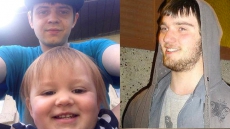OTTAWA — A new study suggests that homeless youth who keep pets have lower levels of depression than their counterparts who are without a dog, cat, or even rat by their side.
The study from the Ontario Veterinary College at the University of Guelph found that homeless youth with pets were three times less likely to be depressed, less likely to engage in potentially harmful behaviours like hard drug use and more likely to open up to veterinarians about their personal challenges.
The study looked at 198 street youth in four cities — Toronto, Ottawa, Kingston, and Hamilton — who were in shelters and drop-in centres. Among the study's participants, 100 didn't have pets and 98 did.
The results match a similar study from California and studies on the benefits of pet ownership on the health of seniors who live alone, for instance.
The findings from the Canadian study, the first of its kind to look at the benefits of pet ownership on homeless youth in the country, were published Thursday in the journal Anthrozoos.
Lead author Michelle Lem said the findings should be a wake-up call to social services that often don't allow homeless people to bring their pets inside places like emergency shelters. Homeless pet owners often refuse to give up their animals in order to access a bed.
She says that has the effect of creating a further barrier for street youth because it is often through shelters that homeless youth access services like addiction counselling.
"A lot of social services think also that many of the youth probably shouldn't have pets because they can't access services with pets," said Lem, founder and director of Community Veterinary Outreach, a volunteer group that provides veterinary services to homeless people in cities like Toronto, Guelph and Ottawa.

"They can't access shelters, they can't access some addictions treatment, they can't go into hospitalization, so they (pets) are barriers to accessing services.
"What we're trying to show is, yeah, they are barriers, but they also have some very positive impacts."
Lem said Canadians often don't understand why a teenager, for instance, becomes homeless. They are usually on the street because of toxic environments at home, trauma or abuse, or harsh judgments from their family for being lesbian, gay, bisexual or transgender, she said.
"When they have pets they're judged even more harshly often: 'How can you have a pet when you can't take care of yourself''?"
She spoke of one young man who talked about how he at one time was repeatedly arrested before he got a dog. He hadn't been arrested during the two years he owned his dog, she said.
Another homeless youth from Montreal who was part of a gang told Lem that "people would see a better side" of him when the dog was around.
"These pets are their only friends, the only way that they've experienced unconditional love without judgment. These pets have saved their lives in many cases," Lem said.
"By asking them to give up their pets to access the shelter, what you're doing as a social service provider is saying, 'I don't understand your relationship' and often it pushes people away."
Lem said she hopes the results of the study encourage more social agencies to allow homeless people to keep their pets in with them.





